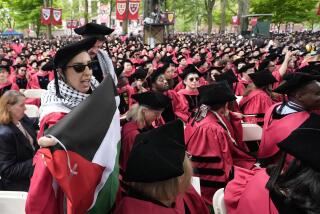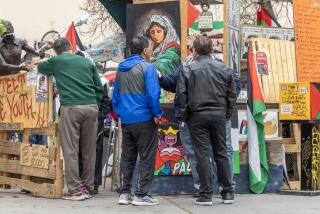Alito’s Membership in Alumni Group Is Under Scrutiny
WASHINGTON — In 1972, at the height of one of the most tumultuous times in higher education, a group of Princeton University graduates staged their own form of protest against the changes they saw around them.
As college campuses roiled with demonstrations over the Vietnam War, feminism and free speech, Concerned Alumni of Princeton -- co-chaired by wealthy alumni from the classes of 1921 and 1930 -- had a narrower agenda: fighting the admissions policy that opened classrooms to women and minorities.
Defunct for almost 20 years and largely forgotten, the organization became a central issue Wednesday in the Supreme Court confirmation hearings of Samuel A. Alito Jr., who graduated from Princeton in 1972.
It was not “because of any attitude toward women or minorities” that he would have joined the group, Alito told the Senate Judiciary Committee. “What bothered me about the Princeton administration ... was the treatment of ROTC” -- which Alito joined as an undergraduate and which lost its contract with the university during the Vietnam protests.
With senators clamoring for papers on Alito’s involvement in the group, and reporters rushing to the university to review documents, the spotlight intensified on the organization whose purpose was to preserve a Princeton of men -- mostly white, mostly wealthy and many conservative.
Last November, the college paper, the Daily Princetonian, noted that in the first issue of Prospect -- the Concerned Alumni of Princeton magazine -- founder Shelby Cullom Davis had written of his Princeton ideal. It was embodied, he wrote, in the alumni he saw at his father’s 50th reunion -- “a body of men, relatively homogenous in interests and backgrounds, who had known and liked each other over the years during which they had contributed much in spirit and substance to the greatness of Princeton.”
Princeton began admitting women as undergraduates in 1969, when Alito was a sophomore. In a fundraising letter a few years later, according to research by the liberal People for the American Way, Concerned Alumni of Princeton urged “a more traditional undergraduate population” and a quota that would limit the female population to 1,000 out of 4,400.
“A student population of approximately 40% women and minorities will largely vitiate the alumni body of the future,” said the letter.
Defenders of the organization argue that it has been misrepresented in the mainstream media and on liberal blogs in a smear campaign against Alito.
“It’s a huge diversion and a bit of a desperation tactic,” said Dinesh D’Souza, who edited Prospect in 1984 and is now a conservative scholar at Stanford University’s Hoover Institution. “It was a conservative organization well within mainstream conservative thought. There was nothing extreme or racist. It attacked racial preferences. It never did take a position against cohabitation.”
Still, the organization left a string of sound bites that liberal critics seized on Wednesday to portray the group -- and, by extension, Alito -- as insensitive to gains by women and minorities.
“Coeducation has ruined the mystique and camaraderies that used to exist,” T. Harding Jones, a classmate of Alito’s and the first editor of Prospect, told the New York Times in 1974.
William A. Rusher, one of the group’s original board members and a former publisher of the conservative magazine National Review, talked about Concerned Alumni of Princeton on the magazine’s website Wednesday.
The organization, he said, was “concerned over various liberal tendencies that had developed in the Princeton administration.” He added: “I will always remember fondly the Princeton I knew, and regret what has happened to it.”
He quoted a colleague approvingly as saying that Princeton had become “just another liberal joint.”
More to Read
Sign up for Essential California
The most important California stories and recommendations in your inbox every morning.
You may occasionally receive promotional content from the Los Angeles Times.










